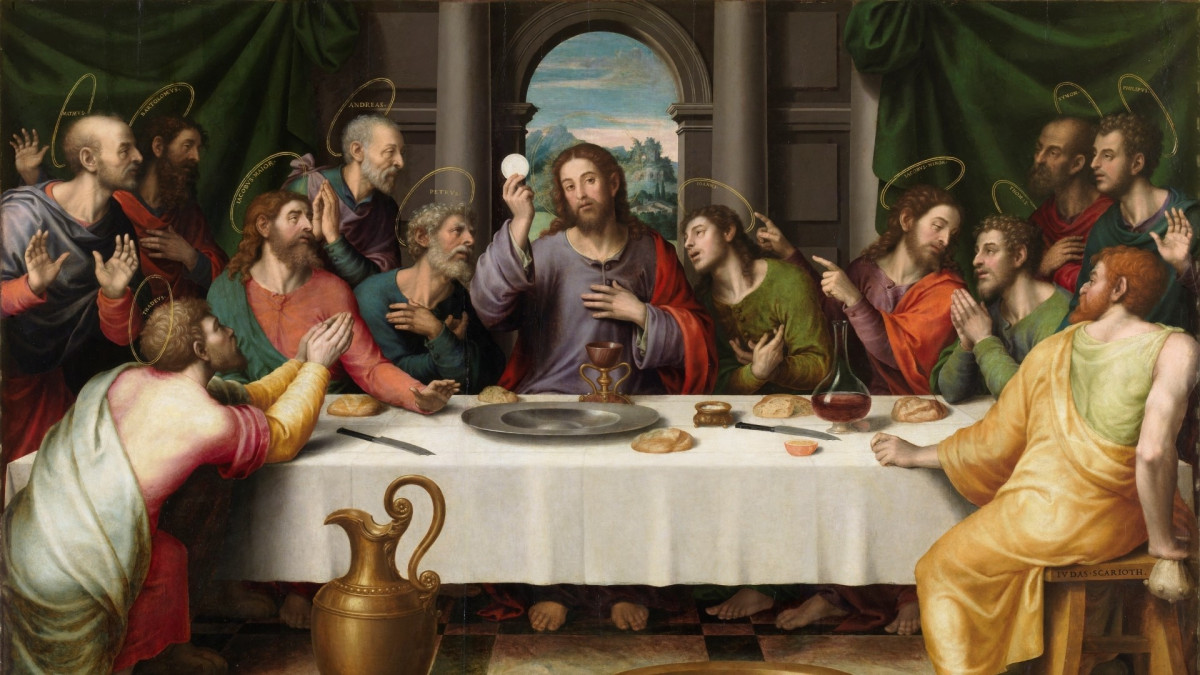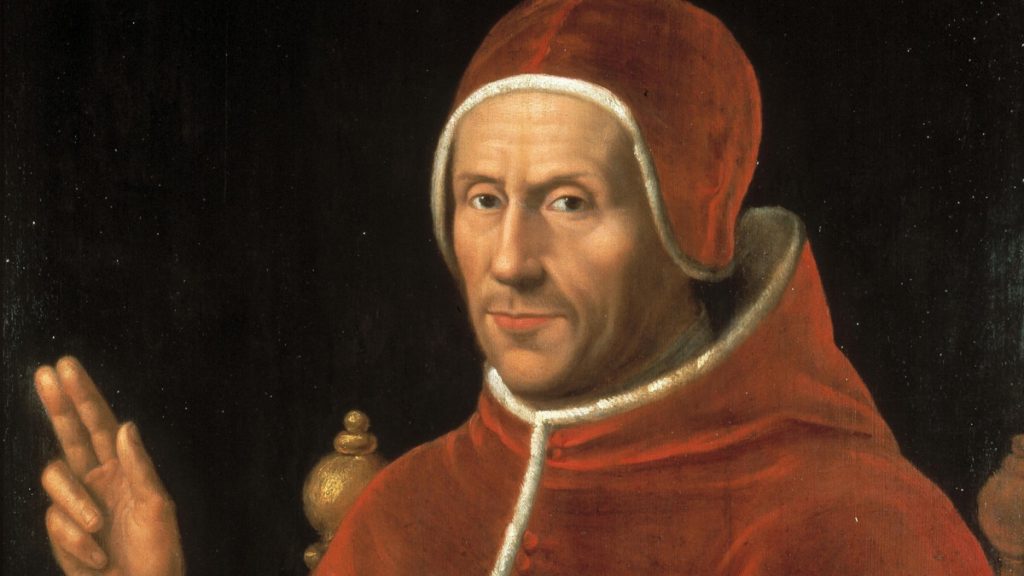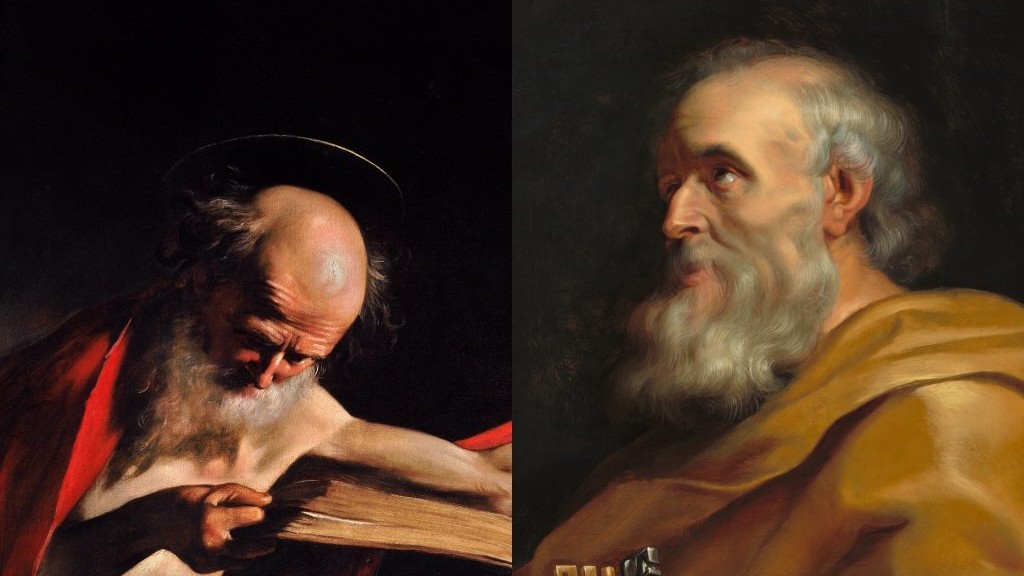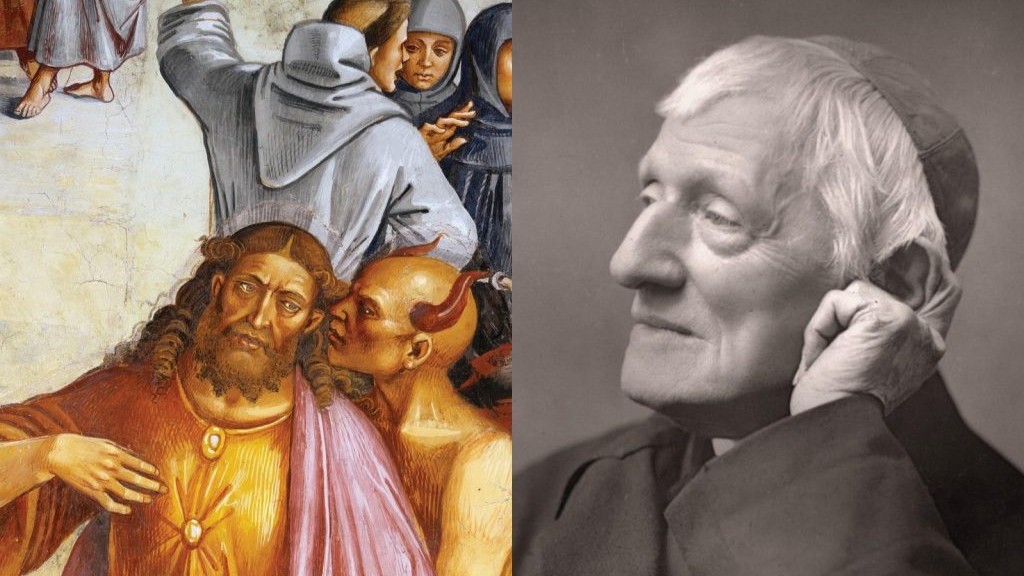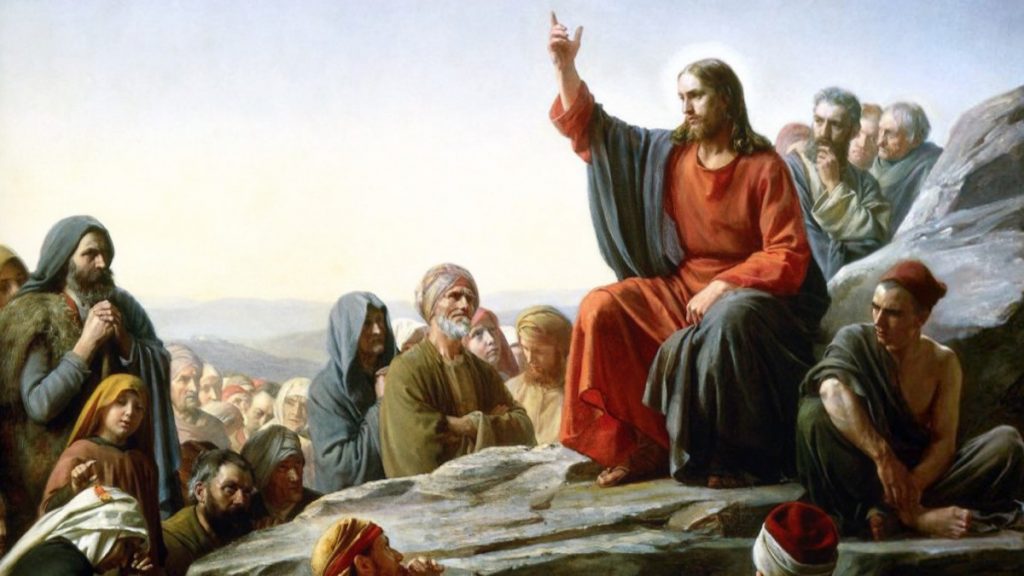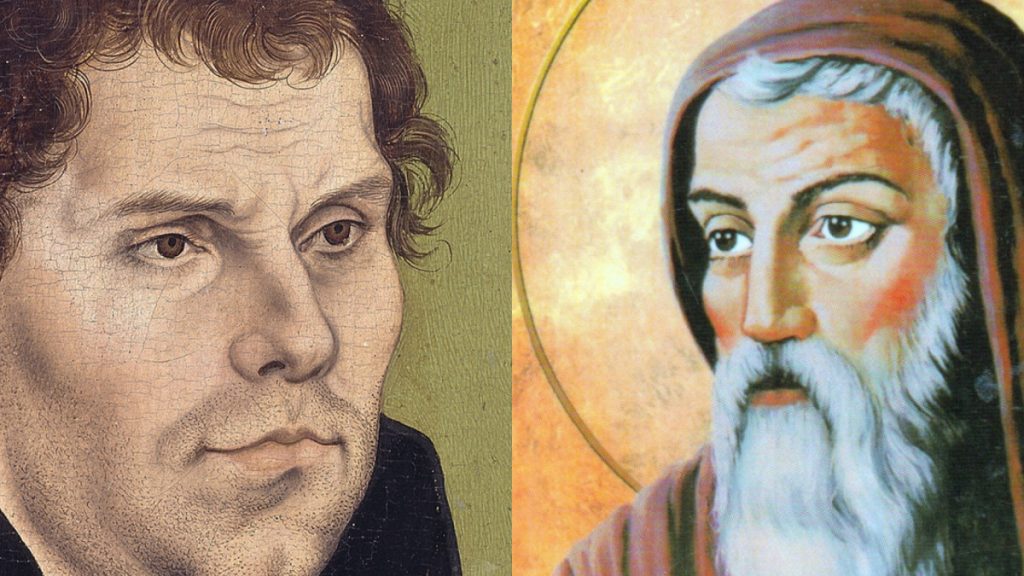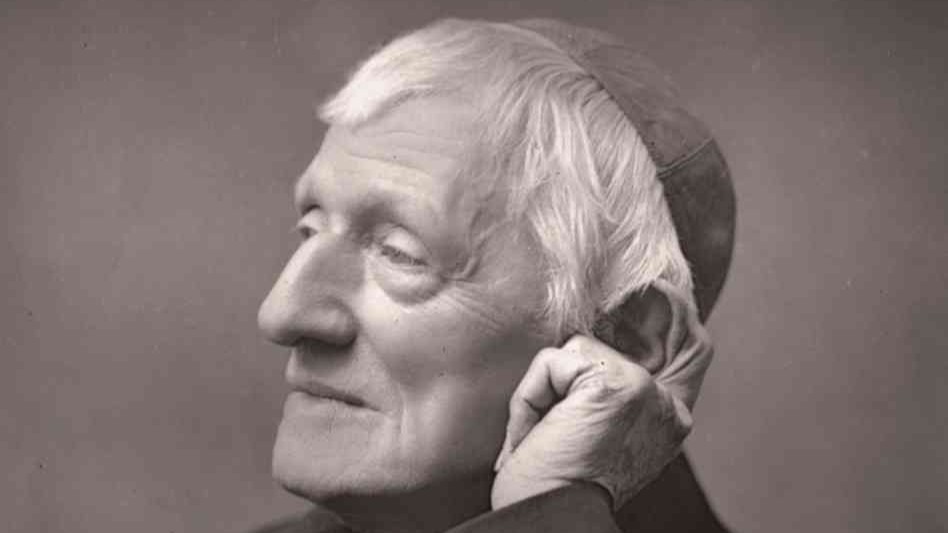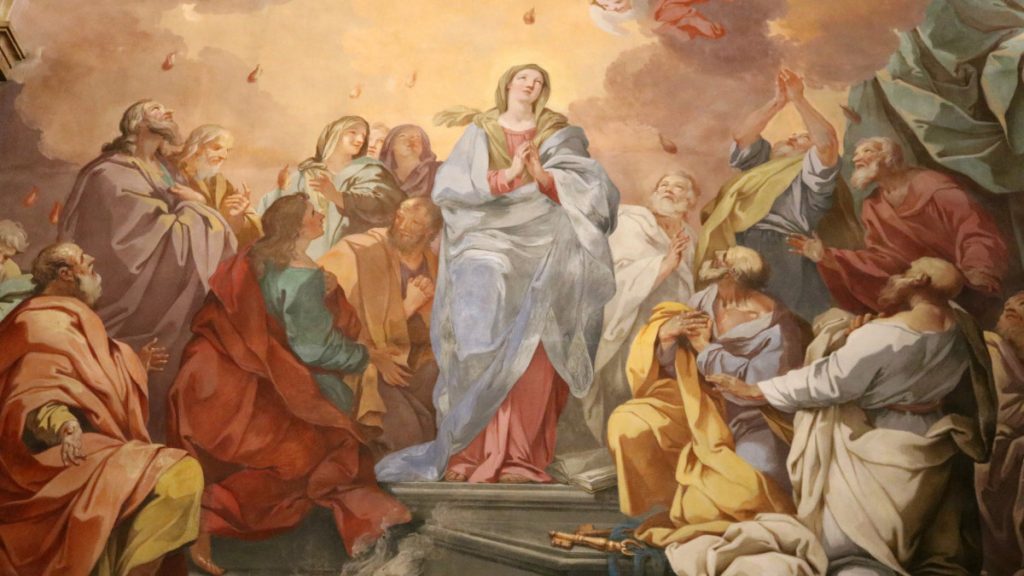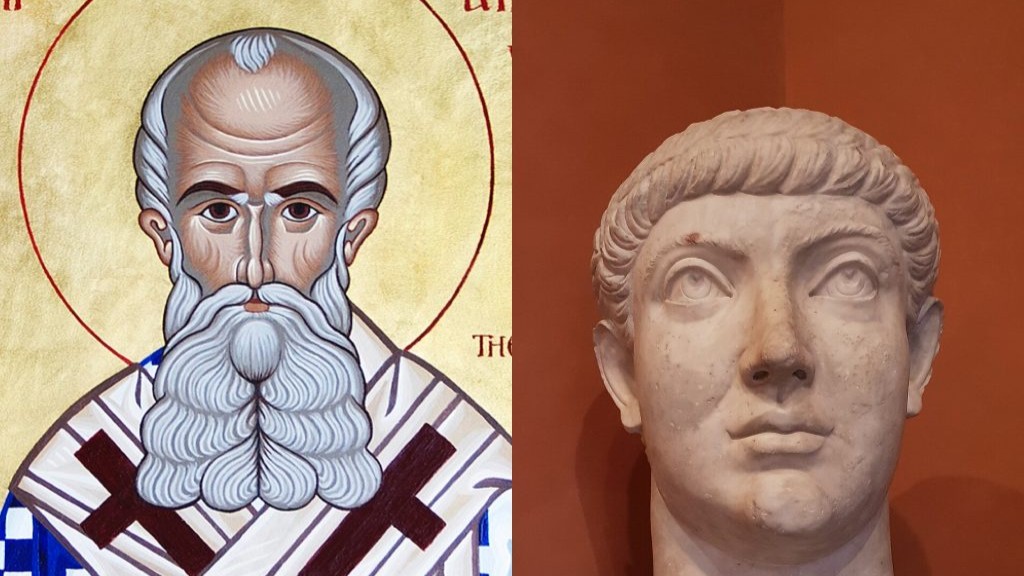After nearly 30 years as a devout Protestant, I decided in February 2018, after nearly a year of in-depth study, to become Catholic. I am set to be received into the Catholic Church at the 2019 Easter Vigil.
When people ask me about my conversion, especially if they are protestants, I half-joke with them, “Well, if you have a whole week, and 12 hours a day, we can get a good start on that.” An overall summary of my conversion can be found in a podcast interview I did, as well as in the newly released book, Mind, Heart, and Soul: Intellectuals and the Path to Rome, which includes the interviews of various intellectuals who converted to Catholicism. Mine is in Chapter 7, entitled “Slapped Across the Face by the Church Fathers.”
While I was consciously investigating Catholicism the year before making the decision, the reality is that I had had many issues with protestantism for many years (protestantism provides no basis for Christian unity beyond an abstraction—which is one of the problems I had with it, its fundamental lack of unity—so I am referring in general to theological doctrines that belong to one or more protestant sects). Thus, my year of consciously studying Catholicism actually turned out to be a year in which I discovered all the issues I had had with protestantism for so long had an answer, and that answer was the teaching of the Catholic Church.
So I’ve decided that I will be doing a large, multi-part series of blogs which show some of the reasons I decided to convert. I feel the need to explain myself, as well as the desire to share my unspeakable joy at becoming Catholic. The journey was in-depth, and so will these blogs—but in bite-size pieces, so as many people can follow along and digest it as possible. I purchased literally hundreds of books in the process of studying Catholicism, and so many of the quotes and points made in those books will be included on these blog posts. I have no idea how many posts will be included, so I’ve simply entitled this first one “Becoming Catholic #1.” As you probably guessed, I’ll simply increase the number as we go along, with a short summary of the topic being discussed.
A big reason why I am writing these posts is not only to explain, in depth, the reasons for my conversion, but also provide good resources for people who simply don’t have the time or willingness to do the sort of in-depth study I have done.
This post is about an incredibly important topic: the Real Presence of Christ in the Eucharist, according to the Church Fathers. Indeed, this was the initial “red pill” I consumed when I opened the first volume of the Apostolic Fathers. These were the earliest Church Fathers, some of whom knew the Apostles themselves—hence their categorization as the “Apostolic Fathers. You can purchase the 38 volume set this came from here. You can also access many of the salient writings of the Church Fathers (including those in the 38 volume set) online, for free, at New Advent, and the Ethereal Library of Christian Classics.
So without further ado, here is a good sample of the quotes from the Church Fathers on the Real Presence of Christ in the Eucharist that blew me away. This is not complete, but you will quickly see that the understanding of the Church Fathers on this point was thoroughly Catholic. Of particular importance: these Fathers are from both West and East. This is not a “Roman” invention. The Orthodox hold the same basic doctrine, along with Catholics, to this very day.
But first, here is the primary (but not only) biblical text upon which the doctrine of the Real Presence of Christ in the Eucharist is based (John 6:22-71):
22 On the next day the people who remained on the other side of the sea saw that there had been only one boat there, and that Jesus had not entered the boat with his disciples, but that his disciples had gone away alone. 23 However, boats from Tiberias came near the place where they ate the bread after the Lord had given thanks. 24 So when the people saw that Jesus was not there, nor his disciples, they themselves got into the boats and went to Capernaum, seeking Jesus.
25 When they found him on the other side of the sea, they said to him, “Rabbi, when did you come here?” 26 Jesus answered them, “Truly, truly, I say to you, you seek me, not because you saw signs, but because you ate your fill of the loaves. 27 Do not labor for the food which perishes, but for the food which endures to eternal life, which the Son of man will give to you; for on him has God the Father set his seal.” 28 Then they said to him, “What must we do, to be doing the works of God?” 29 Jesus answered them, “This is the work of God, that you believe in him whom he has sent.” 30 So they said to him, “Then what sign do you do, that we may see, and believe you? What work do you perform? 31 Our fathers ate the manna in the wilderness; as it is written, ‘He gave them bread from heaven to eat.’” 32 Jesus then said to them, “Truly, truly, I say to you, it was not Moses who gave you the bread from heaven; my Father gives you the true bread from heaven. 33 For the bread of God is that which comes down from heaven, and gives life to the world.” 34 They said to him, “Lord, give us this bread always.”
35 Jesus said to them, “I am the bread of life; he who comes to me shall not hunger, and he who believes in me shall never thirst. 36 But I said to you that you have seen me and yet do not believe. 37 All that the Father gives me will come to me; and him who comes to me I will not cast out. 38 For I have come down from heaven, not to do my own will, but the will of him who sent me; 39 and this is the will of him who sent me, that I should lose nothing of all that he has given me, but raise it up at the last day. 40 For this is the will of my Father, that every one who sees the Son and believes in him should have eternal life; and I will raise him up at the last day.”
41 The Jews then murmured at him, because he said, “I am the bread which came down from heaven.” 42 They said, “Is not this Jesus, the son of Joseph, whose father and mother we know? How does he now say, ‘I have come down from heaven’?” 43 Jesus answered them, “Do not murmur among yourselves. 44 No one can come to me unless the Father who sent me draws him; and I will raise him up at the last day. 45 It is written in the prophets, ‘And they shall all be taught by God.’ Every one who has heard and learned from the Father comes to me. 46 Not that any one has seen the Father except him who is from God; he has seen the Father. 47 Truly, truly, I say to you, he who believes has eternal life. 48 I am the bread of life. 49 Your fathers ate the manna in the wilderness, and they died. 50 This is the bread which comes down from heaven, that a man may eat of it and not die. 51 I am the living bread which came down from heaven; if any one eats of this bread, he will live for ever; and the bread which I shall give for the life of the world is my flesh.”
52 The Jews then disputed among themselves, saying, “How can this man give us his flesh to eat?” 53 So Jesus said to them, “Truly, truly, I say to you, unless you eat the flesh of the Son of man and drink his blood, you have no life in you; 54 he who eats my flesh and drinks my blood has eternal life, and I will raise him up at the last day. 55 For my flesh is food indeed, and my blood is drink indeed. 56 He who eats my flesh and drinks my blood abides in me, and I in him. 57 As the living Father sent me, and I live because of the Father, so he who eats me will live because of me. 58 This is the bread which came down from heaven, not such as the fathers ate and died; he who eats this bread will live for ever.” 59 This he said in the synagogue, as he taught at Capernaum.
60 Many of his disciples, when they heard it, said, “This is a hard saying; who can listen to it?” 61 But Jesus, knowing in himself that his disciples murmured at it, said to them, “Do you take offense at this? 62 Then what if you were to see the Son of man ascending where he was before? 63 It is the spirit that gives life, the flesh is of no avail; the words that I have spoken to you are spirit and life. 64 But there are some of you that do not believe.” For Jesus knew from the first who those were that did not believe, and who it was that should betray him. 65 And he said, “This is why I told you that no one can come to me unless it is granted him by the Father.”
66 After this many of his disciples drew back and no longer went about with him. 67 Jesus said to the twelve, “Will you also go away?” 68 Simon Peter answered him, “Lord, to whom shall we go? You have the words of eternal life; 69 and we have believed, and have come to know, that you are the Holy One of God.” 70 Jesus answered them, “Did I not choose you, the twelve, and one of you is a devil?” 71 He spoke of Judas the son of Simon Iscariot, for he, one of the twelve, was to betray him.
Now, a few quotes from the Church Fathers.
St. Ignatius of Antioch, Letter to the Romans (§7) (c. 107)
I have no delight in corruptible food, nor in the pleasures of this life. I desire the bread of God, the heavenly bread, the bread of life, which is the flesh of Jesus Christ, the Son of God, who became afterwards of the seed of David and Abraham; and I desire the drink of God, namely His blood, which is incorruptible love and eternal life.
St. Ignatius of Antioch, Letter to the Smyrnaeans (§§6-7) (c. 107)
(§6) …But consider those who are of a different opinion with respect to the grace of Christ which has come unto us, how opposed they are to the will of God. They have no regard for love; no care for the widow, or the orphan, or the oppressed; of the bond, or of the free; of the hungry, or of the thirsty.
(§7) They abstain from the Eucharist and from prayer, because they confess not the Eucharist to be the flesh of our Savior Jesus Christ, which suffered for our sins, and which the Father, of His goodness, raised up again. Those, therefore, who speak against this gift of God, incur death in the midst of their disputes.
St. Ignatius of Antioch, Letter to the Philadelphians (§4) (c. 107)
Take you heed, then, to have but one Eucharist. For there is one flesh of our Lord Jesus Christ, and one cup to [show forth] the unity of His blood; one altar; as there is one bishop, along with the presbytery and deacons, my fellow-servants: that so, whatsoever ye do, ye may do it according to [the will of] God.
St. Justin Martyr, First Apology (§66) (c. 151)
And this food is called among us Εὐχαριστία [the Eucharist], of which no one is allowed to partake but the man who believes that the things which we teach are true, and who has been washed with the washing that is for the remission of sins, and unto regeneration [baptism], and who is so living as Christ has enjoined. For not as common bread and common drink do we receive these; but in like manner as Jesus Christ our Savior, having been made flesh by the Word of God, had both flesh and blood for our salvation, so likewise have we been taught that the food which is blessed by the prayer of His word, and from which our blood and flesh by transmutation are nourished, is the flesh and blood of that Jesus who was made flesh. For the apostles, in the memoirs composed by them, which are called Gospels, have thus delivered unto us what was enjoined upon them; that Jesus took bread, and when He had given thanks, said, “This do you in remembrance of Me, this is My body”; and that, after the same manner, having taken the cup and given thanks, He said, “This is My blood”; and gave it to them alone. Which the wicked devils have imitated in the mysteries of Mithras, commanding the same thing to be done. For, that bread and a cup of water are placed with certain incantations in the mystic rites of one who is being initiated, you either know or can learn.
St. Irenaeus of Lyons, Against Heresies (Book 4, Ch. 33, §2; Book 5, Ch. 2, §§2-3) (c. 180)
Moreover, how could the Lord, with any justice, if He belonged to another father, have acknowledged the bread to be His body, while He took it from that creation to which we belong, and affirmed the mixed cup to be His blood?
(§2) But vain in every respect are they who despise the entire dispensation of God, and disallow the salvation of the flesh, and treat with contempt its regeneration, maintaining that it is not capable of incorruption. But if this indeed do not attain salvation, then neither did the Lord redeem us with His blood, nor is the cup of the Eucharist the communion of His blood, nor the bread which we break the communion of His body…He has acknowledged the cup (which is a part of the creation) as His own blood, from which He bedews our blood; and the bread (also a part of the creation) He has established as His own body, from which He gives increase to our bodies.
(§3) When, therefore, the mingled cup and the manufactured bread receives the Word of God, and the Eucharist of the blood and the body of Christ is made, from which things the substance of our flesh is increased and supported, how can they affirm that the flesh is incapable of receiving the gift of God, which is life eternal, which [flesh] is nourished from the body and blood of the Lord, and is a member of Him?—even as the blessed Paul declares in his Epistle to the Ephesians, that “we are members of His body, of His flesh, and of His bones” (Eph. 5:30). He does not speak these words of some spiritual and invisible man, for a spirit has not bones nor flesh; but [he refers to] that dispensation [by which the Lord became] an actual man, consisting of flesh, and nerves, and bones—that [flesh] which is nourished by the cup which is His blood, and receives increase from the bread which is His body. And just as a cutting from the vine planted in the ground fructifies in its season, or as a corn of wheat falling into the earth and becoming decomposed, rises with manifold increase by the Spirit of God, who contains all things, and then, through the wisdom of God, serves for the use of men, and having received the Word of God, becomes the Eucharist, which is the body and blood of Christ; so also our bodies, being nourished by it, and deposited in the earth, and suffering decomposition there, shall rise at their appointed time, the Word of God granting them resurrection to the glory of God, even the Father, who freely gives to this mortal immortality, and to this corruptible incorruption…
St. Clement of Alexandria, The Instructor (Book 1, Ch. 6) (c. 197)
I love to call her the Church. This mother, when alone, had not milk, because alone she was not a woman. But she is once virgin and mother—pure as a virgin, loving as a mother. And calling her children to her, she nurses them with holy milk, viz., with the Word for childhood. Therefore she had not milk; for the milk was this child fair and comely, the body of Christ, which nourishes by the Word the young brood, which the Lord Himself brought forth in throes of the flesh, which the Lord Himself swathed in His precious blood. O amazing birth! O holy swaddling bands! The Word is all to the child, both father and mother and tutor and nurse. “Eat ye my flesh,” He says, “and drink my blood” (John 6:53, 54). Such is the suitable food which the Lord ministers, and He offers His flesh and pours forth His blood, and nothing is wanting for the children’s growth. O amazing mystery! We are enjoined to cast off the old and carnal corruption, as also the old nutriment, receiving in exchange another new regimen, that of Christ, receiving Him if we can, to hide Him within; and that, enshrining the Savior in our souls, we may correct the affections of our flesh.
Tertullian of Carthage, Resurrection of the Flesh (Ch. 8) (c. 210)
It would suffice to say, indeed, that there is not a soul that can at all procure salvation, except it believe whilst it is in the flesh, so true is it that the flesh is the very condition on which salvation hinges. And since the soul is, in consequence of its salvation, chosen to the service of God, it is the flesh which actually renders it capable of such service. The flesh, indeed, is washed, in order that the soul may be cleansed [in baptism]; the flesh is anointed, that the soul may be consecrated; the flesh is signed (with the cross), that the soul too may be fortified; the flesh is shadowed with the imposition of hands, that the soul also maybe illuminated by the Spirit [in confirmation]; the flesh feeds on the body and blood of Christ, that the soul likewise may fatten on its God. They cannot then be separated in their recompense, when they are united in their service….
St. Hippolytus of Rome, Fragment on Proverbs 9:2 (c. 217)
“And she hath furnished her table” (Prov. 9:2): that denotes the promised knowledge of the Holy Trinity. It also refers to His honored and undefiled body and blood, which day by day are administered and offered sacrificially at the spiritual divine table, as a memorial of that first and ever-memorable table of the spiritual divine supper.
Origen, Homily 7 on Numbers (Ch. 2, §2) (c. 249)1
You see the manner in which Paul solves the enigma of the law and teaches the forms of the enigmas and says that “the rock” was an enigma to Moses, before it was joined to this Ethiopian woman of ours. Now, in outward reality, “the rock is Christ,” for now God “speaks mouth to mouth” through the law. Previously, baptism was “in an enigma, in the cloud and in the sea” (cf. 1 Cor. 10:2) but now, in reality, it is a “regeneration in water and in the Holy Spirit” (Tit. 3:5; cf. John 3:5). At that time the manna was food “in an enigma,” but now, “in reality,” the flesh of the Word of God is “true food,” just as he himself says: “My flesh is truly food and my blood is truly drink” (John 6:55). So then, even now Moses takes his place among us and unites with this Ethiopian woman. Either he himself speaks to us, or God speaks to him “not in an enigma, but in reality.”
St. Cyprian of Carthage, Treatise 3: On the Lapsed (§§15-16) (251)
(§15) …He [St. Paul] threatens, moreover, the stubborn and difficult, and denounces them, saying, “Whosoever eats the bread or drinks the cup of the Lord unworthily, is guilty of the body and blood of the Lord” (1 Cor. 11:27).
(§16) All these warnings being scorned and contemned—before their sin is expiated, before confession has been made of their crime, before their conscience has been purged by sacrifice and by the hand of the priest, before the offence of an angry and threatening Lord has been appeased, violence is done to His body and blood; and they sin now against their Lord more with their hand and mouth than when they denied their Lord.
St. Cyprian, Treatise 4: On the Lord’s Prayer (§18) (c. 251/252)
As the prayer goes forward, we ask and say, “Give us this day our daily bread.” And this may be understood both spiritually and literally, because either way of understanding it is rich in divine usefulness to our salvation. For Christ is the bread of life; and this bread does not belong to all men, but it is ours. And according as we say, “Our Father,” because He is the Father of those who understand and believe; so also we call it “our bread,” because Christ is the bread of those who are in union with His body. And we ask that this bread should be given to us daily [at mass], that we who are in Christ, and daily receive the Eucharist for the food of salvation, may not, by the interposition of some heinous sin, by being prevented, as withheld and not communicating, from partaking of the heavenly bread, be separated from Christ’s body, as He Himself predicts, and warns, “I am the bread of life which came down from heaven. If any man eat of my bread, he shall live for ever: and the bread which I will give is my flesh, for the life of the world” (John 6:58). When, therefore, He says, that whoever shall eat of His bread shall live for ever; as it is manifest that those who partake of His body and receive the Eucharist by the right of communion are living, so, on the other hand, we must fear and pray lest any one who, being withheld from communion, is separate from Christ’s body should remain at a distance from salvation; as He Himself threatens, and says, “Unless you eat the flesh of the Son of man, and drink His blood, ye shall have no life in you” (John 6:53). And therefore we ask that our bread—that is, Christ—may be given to us daily, that we who abide and live in Christ may not depart from His sanctification and body.
Ecumenical Council of Nicaea (Can. 18) (325)
It has come to the knowledge of the holy and great Synod that, in some districts and cities, the deacons administer the Eucharist to the presbyters [priests], whereas neither canon nor custom permits that they who have no right to offer should give the Body of Christ to them that do offer…
St. Aphrahat the Persian, Demonstration 12: On the Passover (§6) (c. 340)2
Our Lord said these things and arose, from where he had celebrated the Passover sacrifice and had given his body to eat and his blood to drink, and he went out with his disciples to that place, where he was seized. For after he had eaten his body and drank his blood, he was counted with the dead. Our Lord gave his body by his own hands to eat. He gave his blood to drink before he was crucified.
St. Cyril of Jerusalem, Catechetical Lecture 19 (§7) (c. 350)
Moreover, the things which are hung up at idol festivals [of the pagans], either meat or bread, or other such things polluted by the invocation of the unclean spirits, are reckoned in the pomp of the devil. For as the Bread and Wine of the Eucharist before the invocation of the Holy and Adorable Trinity were simple bread and wine, while after the invocation the Bread becomes the Body of Christ, and the Wine the Blood of Christ, so in like manner such meats belonging to the pomp of Satan, though in their own nature simple, become profane by the invocation of the evil spirit.
St. Cyril of Jerusalem, Catechetical Lecture 22 (§§6, 9) (c. 350)
(§6) Consider therefore the Bread and the Wine not as bare elements, for they are, according to the Lord’s declaration, the Body and Blood of Christ; for even though sense suggests this to thee, yet let faith establish you. Judge not the matter from the taste, but from faith be fully assured without misgiving, that the Body and Blood of Christ have been vouchsafed to you…
(§9) Having learned these things, and been fully assured that the seeming bread is not bread, though sensible to taste, but the Body of Christ; and that the seeming wine is not wine, though the taste will have it so, but the Blood of Christ; and that of this David sung of old, saying, “And bread strengthens man’s heart, to make his face to shine with oil” (Ps. 104:15), “strengthen you your heart,” by partaking thereof as spiritual, and “make the face of your soul to shine.” And so having it unveiled with a pure conscience, may you “reflect as a mirror the glory of the Lord” (2 Cor. 3:18), and proceed from glory to glory in Christ Jesus our Lord, to whom be honor, and might, and glory, forever and ever. Amen.
St. Gregory of Nyssa, The Great Catechism (Ch. 37) (c. 380)
Rightly, then, do we believe that now also the bread which is consecrated by the Word of God is changed into the Body of God the Word. For that Body was once, by implication, bread, but has been consecrated by the inhabitation of the Word that tabernacled in the flesh. Therefore, from the same cause as that by which the bread that was transformed in that Body was changed to a Divine potency, a similar result takes place now. For as in that case, too, the grace of the Word used to make holy the Body, the substance of which came of the bread, and in a manner was itself bread, so also in this case the bread, as says the Apostle, “is sanctified by the Word of God and prayer” (1 Tim. 4:5); not that it advances by the process of eating to the stage of passing into the body of the Word, but it is at once changed into the body by means of the Word, as the Word itself said, “This is My Body.”
Seeing, too, that all flesh is nourished by what is moist (for without this combination our earthly part would not continue to live), just as we support by food which is firm and solid the solid part of our body, in like manner we supplement the moist part from the kindred element; and this, when within us, by its faculty of being transmitted, is changed to blood, and especially if through the wine it receives the faculty of being transmuted into heat.
Since, then, that God-containing flesh partook for its substance and support of this particular nourishment also, and since the God who was manifested infused Himself into perishable humanity for this purpose, viz. that by this communion with Deity mankind might at the same time be deified, for this end it is that, by dispensation of His grace, He disseminates Himself in every believer through that flesh, whose substance comes from bread and wine, blending Himself with the bodies of believers, to secure that, by this union with the immortal, man, too, may be a sharer in incorruption. He gives these gifts by virtue of the benediction through which He transelements the natural quality of these visible things to that immortal thing.
St. Ambrose of Milan, On the Mysteries (Ch. 9, §§50, 58) (c. 390)
(§50) Perhaps you will say, “I see something else, how is it that you assert that I receive the Body of Christ?” And this is the point which remains for us to prove. And what evidence shall we make use of? Let us prove that this is not what nature made, but what the blessing consecrated, and the power of blessing is greater than that of nature, because by blessing nature itself is changed…
(§58) Wherefore, too, the Church, beholding so great grace, exhorts her sons and her friends to come together to the sacraments, saying: “Eat, my friends, and drink and be inebriated, my brother” (Song. 5:1). What we eat and what we drink the Holy Spirit has elsewhere made plain by the prophet, saying, “Taste and see that the Lord is good, blessed is the man that hopes in Him” (Ps. 34:8). In that sacrament is Christ, because it is the Body of Christ, it is therefore not bodily food but spiritual. Whence the Apostle says of its type: “Our fathers ate spiritual food and drank spiritual drink” (1 Cor. 10:3), for the Body of God is a spiritual body; the Body of Christ is the Body of the Divine Spirit, for the Spirit is Christ, as we read: “The Spirit before our face is Christ the Lord” (Lam. 4:20). And in the Epistle of Peter we read: “Christ died for us” (1 Pet. 2:21). Lastly, that food strengthens our heart, and that drink “maketh glad the heart of man” (Ps. 104:15), as the prophet has recorded.
Theodore of Mopsuestia, Catechetical Homily 15 (§10) (c. 410)3
Then, when [our Lord] distributed the bread, he did not say that this is a type of my body, but that “This is my body”; and in like manner as regards the chalice [of wine], that this is not a type of my blood, but that “This is my blood.” For, when we receive the grace coming from the Holy Spirit, [our Lord] wanted us no longer to regard the nature [of the body and blood] but accept them as the body and blood of our Lord. Also the body of our Lord did not naturally possess immortality and [the power] to give immortality, but this was given him by the Holy Spirit. At his resurrection from the dead, he attained to his [full] union with the divine nature, and then became immortal and the cause of others’ becoming immortal.
St. Augustine, Exposition of Psalm 34 (§§1, 9)
(§1) Because there was there a sacrifice after the order of Aaron, and afterwards He of His Own Body and Blood appointed a sacrifice after the order of Melchizedek; He changed then His Countenance in the Priesthood, and sent away the kingdom of the Jews, and came to the Gentiles…
“And was carried in His Own Hands.” How “carried in His Own Hands”? Because when He commended His Own Body and Blood, He took into His Hands that which the faithful know; and in a manner carried Himself, when He said, “This is My Body” (Matt. 26:26)…
(§9) …But let us approach to Him and be lightened; not as the Jews approached to Him, that they might be darkened; for they approached to Him that they might crucify Him. Let us approach to Him that we may receive His Body and Blood. They by Him crucified were darkened; we by eating and drinking The Crucified are lightened. “Approach unto Him, and be you lightened.”
St. Augustine, Sermon 227: Easter, to New Converts on the Sacraments (c. 414-15)4
I am not unmindful of the promise by which I pledged myself to deliver a sermon to instruct you, who have just been baptized, on the Sacrament of the Lord’s table, which you now look upon and of which you partook last night. You ought to know what you have received, what you are going to receive, and what you ought to receive daily. That Bread which you see on the altar, consecrated by the word of God, is the Body of Christ. That chalice, or rather, what the chalice holds, consecrated by the word of God, is the Blood of Christ. Through those accidents the Lord wished to entrust to us His Body and the Blood which He poured out for the remission of sins. If you have received worthily, you are what you have received, for the Apostle says: “The bread is one; we though many, are one body” (1 Cor. 10:17). Thus he explained the Sacrament of the Lord’s table: “The bread is one; we though many, are one body.” So, by bread you are instructed as to how you ought to cherish unity.
St. Augustine, Sermon 272: Pentecost, to New Converts, on the Sacrament (408)5
What you can see on the altar, you also saw last night; but what it was, what it meant, of what great reality it contained the sacrament, you had not yet heard. So what you can see, then, is bread and a cup; that’s what even your eyes tell you; but as for what your faith asks to be instructed about, the bread is the body of Christ, the cup the blood of Christ.
St. Cyril of Alexandria, Third Letter to Nestorius (§7); Council of Ephesus, Session 1 (June 22, 431)6
This too we must add. Proclaiming the death in respect of the flesh of the only-begotten Son of God, that is, Jesus Christ, and acknowledging his return to life from the dead and ascension into heaven, we perform in the churches the bloodless cult, approach the sacramental gifts, and are sanctified by our participation in the holy flesh and the precious blood of Christ the Savior of us all, not by receiving common flesh (God forbid!), nor that of a man sanctified and conjoined to the Word in oneness of dignity or by enjoying the divine indwelling, but as the truly life-giving flesh belonging to the Word himself. For being life by nature as God, when he became one with his own flesh, he made it life-giving, with the result that, although he says to us, “Truly I say to you, unless you eat the flesh of the son of man and drink his blood…” (John 6:53) we shall not attribute even this to a human individual like us (for how could human flesh be life-giving of its own nature?) but shall count it as having truly become the very own flesh of the one who became for us, and was accounted, son of man.
St. John of Damascus, An Exact Exposition of the Orthodox Faith (Book 4, Ch. 13) (8th century)
If then the Word of God is quick and energizing [Heb. 4:12], and the Lord did all that He willed [Ps. 135:6]; if He said, “Let there be light” and there was light, “let there be a firmament” and there was a firmament (Gen. 1:3, 6); if the heavens were established by the Word of the Lord and all the host of them by the breath of His mouth [Ps. 33:6]; if the heaven and the earth, water and fire and air and the whole glory of these, and, in sooth, this most noble creature, man, were perfected by the Word of the Lord; if God the Word of His own will became man and the pure and undefiled blood of the holy and ever-virginal One made His flesh without the aid of seed, can He not then make the bread His body and the wine and water His blood? He said in the beginning, “Let the earth bring forth grass” (Gen. 1:11), and even until this present day, when the rain comes it brings forth its proper fruits, urged on and strengthened by the divine command. God said, “This is My body,” and “This is My blood, and this do you in remembrance of Me.” And so it is at His omnipotent command “until He come”; for it was in this sense that He said until He come. And the overshadowing power of the Holy Spirit becomes through the invocation the rain to this new tillage. For just as God made all that He made by the energy of the Holy Spirit, so also now the energy of the Spirit performs those things that are supernatural and which it is not possible to comprehend unless by faith alone. “How shall this be,” said the holy Virgin, “seeing I know not a man?” And the archangel Gabriel answered her: “The Holy Spirit shall come upon you, and the power of the Highest shall overshadow you” (Luke 1:34, 35). And now you ask, how the bread became Christ’s body and the wine and water Christ’s blood. And I say unto you, “The Holy Spirit is present and does those things which surpass reason and thought.”
Further, bread and wine are employed, for God knows man’s infirmity. For in general man turns away discontentedly from what is not well-worn by custom; and so with His usual indulgence He performs His supernatural works through familiar objects. And just as, in the case of baptism, since it is man’s custom to wash himself with water and anoint himself with oil, He connected the grace of the Spirit with the oil and the water and made it the water of regeneration, in like manner since it is man’s custom to eat and to drink water and wine, He connected His divinity with these and made them His body and blood in order that we may rise to what is supernatural through what is familiar and natural.
Footnotes
- Origen, Thomas P. Scheck, trans., Ancient Christian Texts: Homilies on Numbers, Origen (Downers Grove, IL: IVP Academic, 2009), 26. ↩︎
- St. Aphrahat the Persian, Kuriakose Valavanolickal, trans., Aphrahat Demonstrations II (Kerala, India: St. Ephrem Ecumenical Research Institute, 2005), 23-24. ↩︎
- Theodore of Mopsuestia, Frederick G. McLeod, trans., Theodore of Mopsuestia (London: Routledge, 2009), 168-69. ↩︎
- St. Augustine, Mary Sarah Muldowney, RSM, trans., The Fathers of the Church, Vol. 38: Saint Augustine, Sermons on the Liturgical Seasons (Washington, DC: The Catholic University of America Press, 1959), 195-96. Another source: St. Augustine, Edmund Hill, OP, trans., The Works of Saint Augustine, Vol. 6: Sermons 184-229Z (New Rochelle, NY: New City Press, 1993), 254. ↩︎
- St. Augustine, Edmund Hill, OP, trans., The Works of Saint Augustine, Vol. 7: Sermons 230-272B (New Rochelle, NY: New City Press, 1993), 300. ↩︎
- Richard Price, trans., The Council of Ephesus of 431: Documents and Proceedings (Liverpool: Liverpool University Press, 2022), 166. Another source on CCEL. ↩︎
